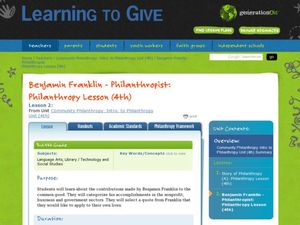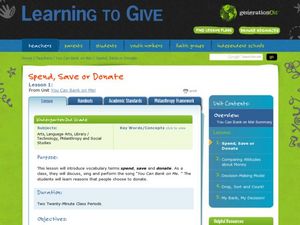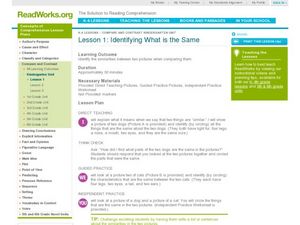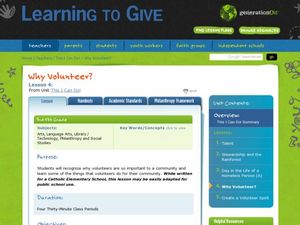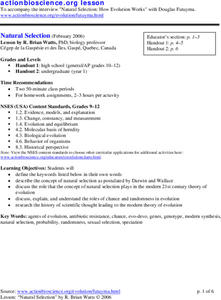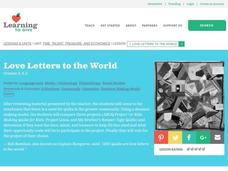Curated OER
Today We Will Learn About Prefixes: non- not
Nonverbal, nonfat, nonfiction. The prefix non- (meaning not) is the focus of this affixes presentation that concludes with a check for understanding.
Curated OER
Who Polluted the River?
Study the impact of water pollution. A hands-on experiment and an interactive story about water pollution are the basis for the learning experience.
Curated OER
Food Insecurity
Explore food insecurity and resource scarcity with your class. They discuss the sharing of scarce resources, how to be good caretakers of these resources, and how choices impact the entire world.
Curated OER
Benjamin Franklin- Philanthropist
Students research and read a profile of Benjamin Franklin. In this philanthropic lesson, students research the projects of Benjamin Franklin and determine which were philanthropic, which were governmental and which were business...
Curated OER
What's Being Done?
Students explore the concept of animal welfare. In this philanthropy lesson, students examine legislation that supports animals in their state as well as the role of the American Society for the Prevention of Cruelty to...
Curated OER
Community Foundations and Procedure
Young scholars understand what a community foundation is and how it gets input from the community. In this community foundation lesson, students form an advisory board to give suggestions. Young scholars learn procedures to hold meetings...
Curated OER
Community Foundations and Procedure
Students research a foundation in their community and how it helps its citizens. They form a youth advisory committee and make recommendations to the mock boards of directors. They practice using parliamentary procedure to complete their...
Learning to Give
Africa - The Great Southland
Applying the five themes of geography, preteen explorers develop a visual aid for younger learners in celebration African American History Month. They investigate the political, geographic, economic, and social aspects of the continent...
Curated OER
Drinking and Driving
Learners select resources relating to alcohol relate dissues of drinking and driving. They explain the dangers of mixing drinking and driving. Students discuss the dangaer of drinking and driving using notes from Internet investigations....
Curated OER
Searching the THC Website
Students use the internet to validate different websites. They examine the Texas Historical Commission's website and complete a question and answer section. They discuss the information they gathered with the class.
Curated OER
Meeting a Member of a Youth Advisory Committee
Students attend a meeting with a Youth Advisory Committee. They explain the purpose of the committee and participate in a class discussion. They develop a list of the duties of the committee and how it could benefit their class.
Curated OER
What We Can Learn From Oral History
Students read oral history accounts of the 1930s and 1940s from "The Greatest Generation" books. They discuss how the common good and civil society was strengthed by these men and what they did for America. They research another time...
Curated OER
The Power of Storytelling
Young scholars are creating their own stories to understand life. The use of history is used to help one to create one's own story. The skill of writing is emphasized as a tool to learn history.
Curated OER
You Can Bank on Me!
Students identify reasons people choose to donate. In this donating lesson, students contrast the words spend, save, and donate. Students learn a song about donating, brainstorm reasons to give, and make sound choices with their money.
Curated OER
Identifying What is the Same
Learn to identify similarities in a kindergarten language arts lesson. After view a set of pictures, they describe what is similar. Learners then complete a worksheet in which they find similarities. Use the activity in groups or as a...
Curated OER
Explicit Information versus Drawing Conclusions
Third graders identify explicit information and draw conclusions from text. In this instructional lesson, 3rd graders review models of each question type (explicit and conclusion) and practice reading a passage to answer questions.
Curated OER
Why Volunteer?
Students explore the concept of philanthropy. In this service learning lesson, students explore the spirit of volunteering as they locate news articles or advertisements regarding the topic. Students discuss whom benefits from volunteer...
Curated OER
Disaster Relief - You Can Count On Me!
Students practice stewardship. For this service learning lesson, students respond to those in need after a natural disaster as they investigate philanthropy.
Curated OER
Natural Selection
Students use discussion questions, handout information and research topics to explore several issues related to natural selection and evolution. They examine Darwin's research on the finch and antibiotic resistance.
Curated OER
Love Letters to the World
Students practice personal decision making. In this philanthropy lesson, students compare three different projects, identify the opportunity cost of each, and make a personal decision about which project they feel the class would pursue.
Curated OER
Philanthropy, You, And Your World Lesson 1: Characterizing Philanthropic People
Students determine the meaning of philanthropy and list attributes of philanthropic people. They examine philanthropic acts of themselves and others using a song and Post-It note activity.
Curated OER
Citizen Participation
Young scholars compare and contrast political parties and interest groups. They examine the role citizens play in how to improve the community. They develop a survey to determine the needs and services opportunities in their community.
Curated OER
Love Letters to the World
Pupils compare three service projects and decide on one to carry out in their community. They determine the opportunity costs of completing one project over another and vote for the one they want to complete. Students realize how...
Curated OER
Presidential Trading Cards
Students use the internet to gather information about Presidents of the United States and create a trading card for one of them. They create a brochure with the president's information and accomplishments.





